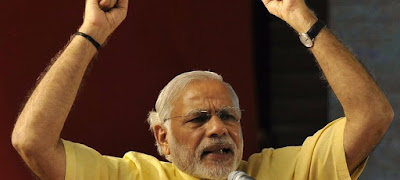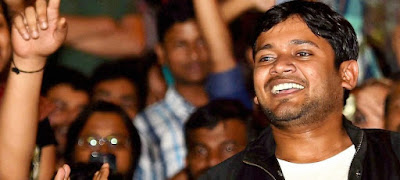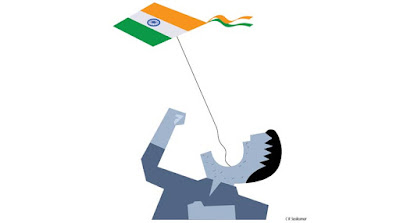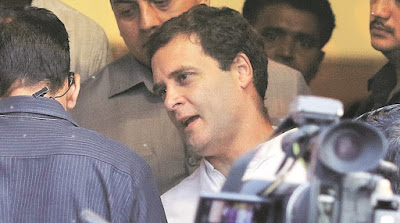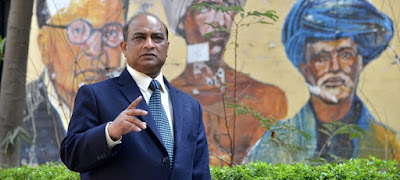Hindutva politics
The cult has been used to whip up support for a Hindu rashtra and consolidate Hindu votes.
Mrinal Pande · Mar 07, 2016 · 05:30 pm
In 1950, when India became a Republic, I was four and my mother was 25. I grew up hearing how my mother – like most girls from upper caste, middle class families – would have been schooled at home and married off in her early teens, but for an unusually liberal father who packed off my mother and her siblings to Rabindranath Tagore’s Shantiniketan. She emerged a graduate after 12 years there and later became a Hindi writer of repute. We were also reminded frequently that were it not for subsidised university education and Western science, my father, a humble village postmaster’s son, would never have acquired a first-class Master’s degree in Chemistry . My parents told my sisters and I repeatedly that our right to a wholesome education and a well-paid job afterwards was absolute. But they never let on that within most families, and on the campuses of India in the 1930s, the bourgeoisie were a very complex and deeply divided phenomena. We were never told about the ideological divide within Mahatma Gandhi’s Congress or even within our own larger family.
My father was an educationist. He set up a chain of state-run schools with local help in a far off Himalayan region after the Indo China war. Did they also have to battle their Brahminical tradition-bound families or the state government? Did they take them on, or did they capitulate on various fronts? Was it worthwhile?
Nationalist discourse
As I watched the repeated suppression of writers, thinkers, intellectuals and, most recently, students, along with the string of lies spewed out by our rulers to justify it, I was reminded of the gap in our understanding of the processes at work in India and was so upset I could hardly speak.
Peace protests, pacifist appeals and a global protest against the suppression of free speech, nothing seemed to work, as our nation entered a long, dark tunnel of fascism with a domestic face – that of lawyers and other right-wing activists, who called themselves proud sons of Bharat Mata, beating up citizens they judged to be traitors.
It was at that point when I began to re-read the literature and popular tracts of the 1920s. That was the period my parents grew up in, and there were two opposing sets of views about the nationalist discourse and cultural identity of the middle classes in India.
On both sides, traditionally embedded and national social values about class, caste and gender fed into each other. So while my mother and her siblings enjoyed their school years in one of the most liberal co-educational campuses in the country under the benign gaze of Tagore, artist Nandalal Bose, Sanskrit scholar Kshiti Mohan Sen and Hindi novelist and historian Hazari Prasad Dwivedi, most girls in their age group were married before they reached puberty to live lives as wives and mothers dependent on men, as laid down by Manu centuries ago.
The perfect woman
In the Hindi belt, the Stri Dharma Prashnottari, a 40-page monograph on women’s duties, published by the Gita Press, Gorakhpur, was a bestseller and did the rounds of middle class families. It recorded a conversation between an ideal woman, Savitri, and her simple acolyte, Sarala, whom she lectured about how to be a good wife, mother and daughter-in-law. Here was a template for an ideal Hindu woman whose morality, purity and chastity were to be the bedrock for the ideal Sanatan Hindu family – deemed the building block of a Hindu rashtra for the Hindu right wing that strongly opposed Gandhi and Ambedkar’s vision of an egalitarian, secular India.
Savitri’s views in the tract were enunciated very clearly – liberal Western education to girls posed a grave threat to the nation and must be opposed. As they matured, women’s strong sexual urges posed a threat to all so girls must be married before attaining puberty so that their sexuality could be contained before it created mayhem. Women only gained importance as mothers of sons – as it was them who would raise obedient and devoted citizens to serve the nation state.
With this template in place, the figure of the traditional Hindu mother goddess was soon invoked. So, in 1936, from Bengal, the land of Durga worshippers, came Anand Math, a novel in Bengali by Bankim Chandra Chattopadhyay. The novel laid a solid foundation for the cult of Bharat Mata. In the preface to an English translation in 1992, the translator BK Roy declared that Bankim’s “great achievement for India was that he made patriotism a religion and his writings had become a gospel of India’s struggle for political independence.” He went on to describe how Vande Mataram (I bow to the mother nation), a song sung by a band of revolutionaries in the novel, became the rallying call for nationalists. The translator thanked Bankim profusely for having created a lineage of revolutionaries, who would always be kept alive by Bharat Mata’s militant Hindu nationalist sons and daughters.
The Hindu state
The vision outlined above was evoked on a spectacular scale by the Vishwa Hindu Parishad in 1983 during its Ekatmata Yajna or Sacrifice for National Unity, a month-long yatra that criss-crossed the country. During this yatra, the Hindutva group combined abstract concepts such as gender and religious identity and sought to give them tangible shape by weaving together legends about the Mother Goddess and national heroes, consecrating them through age-old Vedic rituals.
The tapestry thus created became the basis of a Hindu nation state, which in turn was a combination of the European political concept of the nation-state and Veer Savarkar’s 1922 treatise, Essentials of Hindutva, where he set forth his idea of a Hindu nation united by a common Hindu culture.
But invented traditions are not static. They need to be reinvented in specific contexts to produce and challenge newer identities based on class, religion and gender. After the 1950s, justifying Hindu patriarchy’s differentiation of social space into private and public required a new vision of the motherhood of Bharat Mata.
None of the three major Hindu goddesses – Kali, Lakshmi, and Saraswati – are biological mothers. So the state’s apotheosis into a mother goddess required that the image of the mother goddess be trimmed somewhat, and she be presented primarily as a devoted, selfless and spiritually inclined mother of Hindu sons. She inspired her sons to shed the blood of all those who resisted her aura. Her sons would be ready to lay down their lives, if need be, to save her honour and punish infidels – who we are told repeatedly are non-Bharat Mata worshippers, the unpatriotic seditionists who need to be taught a swift lesson by being beaten up and jailed. To inculcate this philosophy, the champions of the cult of Bharat Mata have repeatedly insisted that all citizens – from cinema halls to university campuses – show unequivocal respect for Bharat Mata’s symbols, the national anthem, Vande Mataram and the tricolour.
Bharat Mata temple
A temple to Bharat Mata had come up in in Varanasi in the 1920s, and another came up in the pilgrimage town of Haridwar in the mid-1980s. It was built by Swami Satymitranand Giri, a Vishwa Hindu Parishad leader praised in temple handbooks for having raised substantial funds from the non-resident children of Bharat Mata. The English guidebook – Bharat Mata Mandir, A Candid Appraisal – said Swami’s decision to build the temple arose from a vision. “In all ancient cultures, the Divine mother is the cause off (sic) Creation,” said the booklet. “It is hoped that the visit to this shrine… will inspire devotion and dedication to Mother-Land.”
Six weeks after the area for the temple was consecrated, the Vishwa Hindu Parishad mounted its Ekatmata Yajna, a carefully planned month-long event during which trucks disguised as chariots doubled up as mobile Bharat Mata temples. These trucks transported images of the mother goddess or Bharat Mata with pots of Ganga water all over India for mass rituals of public worship by all her deemed children (read Hindu nationalists). This made Bharat Mata, or the concept of the nation as a militant goddess, a distinct all-India phenomenon. This was also when it became certain that the political arm of the Sangh Parivar – the Bharatiya Janata Party – would use the cult of Bharat Mata to whip up support for a Hindu rashtra and consolidate Hindu votes in its favour, like it did in the ’90s with the yet-to-be built Ram temple in Ayodhya.
The floors above the Bharat Mata shrine in Haridwar house shrines to shoor (military heroes), sants or saints and Satis or pious widows who chose to burn themselves on their husbands’ pyres. A floor dedicated to great spiritual teachers is dominated by statues of the mystic Ramakrishna, and his disciple Vivekanand. There is also a statue of Sri Aurobindo, but none for his spiritual collaborator, Mirra Alfassa, better known as the Mother of the Sri Aurobindo Ashram in Puducherry. The only woman honoured with a statue in the temple complex is Sharada Ma, the wife and disciple of Ramakrishna.
Not the lunatic fringe
The problem is that democracy, like capitalism, is ultimately a numbers game. Today this heady mix of religion and politics has started to generate toxic side effects among the 69% population that did not vote for the Right in the 2014 general elections. This is an unforeseen headache for the Bharatiya Janata Party. In the aftermath of the events at Jawaharlal Nehru University, we saw its hitherto cocky leadership betray a paranoid sense of embattlement, as first intellectuals and then Dalits and students raised their voices against the State. The lesser members of the party immediately delivered hate speeches against the dissidents, calling for war against intellectuals, the Left, all those suspected of being Left sympathisers and those who believe in secularism. As members of the Union cabinet and BJP members of state Assemblies began to articulate a deep hatred for secular principles, gender justice and free speech, it soon became hard to dismiss them as the lunatic fringe.
Something other than a lapse of logic seemed to be at work here. First, Rohith Vemula, a Dalit PhD student from Hyderabad Central University, committed suicide after his university stopped his meagre stipend. His friends said that Vemula had been targeted for raising issues under the banner of the Ambedkar Students Association. A few weeks later, a mob chanting Bharat Mata ki jai thrashed students, teachers and journalists within the Patiala House courts because the mob had decided that they were anti-national, Pakistan (read Muslim) sympathisers. Some TV news channels backed these self-appointed children of Bharat Mata, whipping up the hysteria further with doctored tapes and calls for a state crackdown on those who did not support their theory of nationalism. Damage control failed. Dalit leaders, intellectuals and students refused to buy the argument first articulated by the Bharat Mata temple compendium, and later theatrically articulated by the Union minister for Human Resource Development, Smriti Irani, in Parliament.
But no political power on earth has been able to muffle public dissent forever. It emerges first within homes and hostels, dhabas and office canteens, then spills over in public places till university campuses erupt like volcanoes. Prescribed normality then turns into a myth. At a point like this, the only way to stay calm is to take each day as it comes, and to use what we know from history. Let them all come: the Right, the Left, the Socialists, the Dalit panthers and Tamil tigers, feminists and LGBT activists. Let our histories mix – anything, as long as they do not set about building a wall.
We welcome your comments at letters@scroll.in
The cult has been used to whip up support for a Hindu rashtra and consolidate Hindu votes.
Mrinal Pande · Mar 07, 2016 · 05:30 pm
In 1950, when India became a Republic, I was four and my mother was 25. I grew up hearing how my mother – like most girls from upper caste, middle class families – would have been schooled at home and married off in her early teens, but for an unusually liberal father who packed off my mother and her siblings to Rabindranath Tagore’s Shantiniketan. She emerged a graduate after 12 years there and later became a Hindi writer of repute. We were also reminded frequently that were it not for subsidised university education and Western science, my father, a humble village postmaster’s son, would never have acquired a first-class Master’s degree in Chemistry . My parents told my sisters and I repeatedly that our right to a wholesome education and a well-paid job afterwards was absolute. But they never let on that within most families, and on the campuses of India in the 1930s, the bourgeoisie were a very complex and deeply divided phenomena. We were never told about the ideological divide within Mahatma Gandhi’s Congress or even within our own larger family.
My father was an educationist. He set up a chain of state-run schools with local help in a far off Himalayan region after the Indo China war. Did they also have to battle their Brahminical tradition-bound families or the state government? Did they take them on, or did they capitulate on various fronts? Was it worthwhile?
Nationalist discourse
As I watched the repeated suppression of writers, thinkers, intellectuals and, most recently, students, along with the string of lies spewed out by our rulers to justify it, I was reminded of the gap in our understanding of the processes at work in India and was so upset I could hardly speak.
Peace protests, pacifist appeals and a global protest against the suppression of free speech, nothing seemed to work, as our nation entered a long, dark tunnel of fascism with a domestic face – that of lawyers and other right-wing activists, who called themselves proud sons of Bharat Mata, beating up citizens they judged to be traitors.
It was at that point when I began to re-read the literature and popular tracts of the 1920s. That was the period my parents grew up in, and there were two opposing sets of views about the nationalist discourse and cultural identity of the middle classes in India.
On both sides, traditionally embedded and national social values about class, caste and gender fed into each other. So while my mother and her siblings enjoyed their school years in one of the most liberal co-educational campuses in the country under the benign gaze of Tagore, artist Nandalal Bose, Sanskrit scholar Kshiti Mohan Sen and Hindi novelist and historian Hazari Prasad Dwivedi, most girls in their age group were married before they reached puberty to live lives as wives and mothers dependent on men, as laid down by Manu centuries ago.
The perfect woman
In the Hindi belt, the Stri Dharma Prashnottari, a 40-page monograph on women’s duties, published by the Gita Press, Gorakhpur, was a bestseller and did the rounds of middle class families. It recorded a conversation between an ideal woman, Savitri, and her simple acolyte, Sarala, whom she lectured about how to be a good wife, mother and daughter-in-law. Here was a template for an ideal Hindu woman whose morality, purity and chastity were to be the bedrock for the ideal Sanatan Hindu family – deemed the building block of a Hindu rashtra for the Hindu right wing that strongly opposed Gandhi and Ambedkar’s vision of an egalitarian, secular India.
Savitri’s views in the tract were enunciated very clearly – liberal Western education to girls posed a grave threat to the nation and must be opposed. As they matured, women’s strong sexual urges posed a threat to all so girls must be married before attaining puberty so that their sexuality could be contained before it created mayhem. Women only gained importance as mothers of sons – as it was them who would raise obedient and devoted citizens to serve the nation state.
With this template in place, the figure of the traditional Hindu mother goddess was soon invoked. So, in 1936, from Bengal, the land of Durga worshippers, came Anand Math, a novel in Bengali by Bankim Chandra Chattopadhyay. The novel laid a solid foundation for the cult of Bharat Mata. In the preface to an English translation in 1992, the translator BK Roy declared that Bankim’s “great achievement for India was that he made patriotism a religion and his writings had become a gospel of India’s struggle for political independence.” He went on to describe how Vande Mataram (I bow to the mother nation), a song sung by a band of revolutionaries in the novel, became the rallying call for nationalists. The translator thanked Bankim profusely for having created a lineage of revolutionaries, who would always be kept alive by Bharat Mata’s militant Hindu nationalist sons and daughters.
The Hindu state
The vision outlined above was evoked on a spectacular scale by the Vishwa Hindu Parishad in 1983 during its Ekatmata Yajna or Sacrifice for National Unity, a month-long yatra that criss-crossed the country. During this yatra, the Hindutva group combined abstract concepts such as gender and religious identity and sought to give them tangible shape by weaving together legends about the Mother Goddess and national heroes, consecrating them through age-old Vedic rituals.
The tapestry thus created became the basis of a Hindu nation state, which in turn was a combination of the European political concept of the nation-state and Veer Savarkar’s 1922 treatise, Essentials of Hindutva, where he set forth his idea of a Hindu nation united by a common Hindu culture.
But invented traditions are not static. They need to be reinvented in specific contexts to produce and challenge newer identities based on class, religion and gender. After the 1950s, justifying Hindu patriarchy’s differentiation of social space into private and public required a new vision of the motherhood of Bharat Mata.
None of the three major Hindu goddesses – Kali, Lakshmi, and Saraswati – are biological mothers. So the state’s apotheosis into a mother goddess required that the image of the mother goddess be trimmed somewhat, and she be presented primarily as a devoted, selfless and spiritually inclined mother of Hindu sons. She inspired her sons to shed the blood of all those who resisted her aura. Her sons would be ready to lay down their lives, if need be, to save her honour and punish infidels – who we are told repeatedly are non-Bharat Mata worshippers, the unpatriotic seditionists who need to be taught a swift lesson by being beaten up and jailed. To inculcate this philosophy, the champions of the cult of Bharat Mata have repeatedly insisted that all citizens – from cinema halls to university campuses – show unequivocal respect for Bharat Mata’s symbols, the national anthem, Vande Mataram and the tricolour.
Bharat Mata temple
A temple to Bharat Mata had come up in in Varanasi in the 1920s, and another came up in the pilgrimage town of Haridwar in the mid-1980s. It was built by Swami Satymitranand Giri, a Vishwa Hindu Parishad leader praised in temple handbooks for having raised substantial funds from the non-resident children of Bharat Mata. The English guidebook – Bharat Mata Mandir, A Candid Appraisal – said Swami’s decision to build the temple arose from a vision. “In all ancient cultures, the Divine mother is the cause off (sic) Creation,” said the booklet. “It is hoped that the visit to this shrine… will inspire devotion and dedication to Mother-Land.”
Six weeks after the area for the temple was consecrated, the Vishwa Hindu Parishad mounted its Ekatmata Yajna, a carefully planned month-long event during which trucks disguised as chariots doubled up as mobile Bharat Mata temples. These trucks transported images of the mother goddess or Bharat Mata with pots of Ganga water all over India for mass rituals of public worship by all her deemed children (read Hindu nationalists). This made Bharat Mata, or the concept of the nation as a militant goddess, a distinct all-India phenomenon. This was also when it became certain that the political arm of the Sangh Parivar – the Bharatiya Janata Party – would use the cult of Bharat Mata to whip up support for a Hindu rashtra and consolidate Hindu votes in its favour, like it did in the ’90s with the yet-to-be built Ram temple in Ayodhya.
The floors above the Bharat Mata shrine in Haridwar house shrines to shoor (military heroes), sants or saints and Satis or pious widows who chose to burn themselves on their husbands’ pyres. A floor dedicated to great spiritual teachers is dominated by statues of the mystic Ramakrishna, and his disciple Vivekanand. There is also a statue of Sri Aurobindo, but none for his spiritual collaborator, Mirra Alfassa, better known as the Mother of the Sri Aurobindo Ashram in Puducherry. The only woman honoured with a statue in the temple complex is Sharada Ma, the wife and disciple of Ramakrishna.
Not the lunatic fringe
The problem is that democracy, like capitalism, is ultimately a numbers game. Today this heady mix of religion and politics has started to generate toxic side effects among the 69% population that did not vote for the Right in the 2014 general elections. This is an unforeseen headache for the Bharatiya Janata Party. In the aftermath of the events at Jawaharlal Nehru University, we saw its hitherto cocky leadership betray a paranoid sense of embattlement, as first intellectuals and then Dalits and students raised their voices against the State. The lesser members of the party immediately delivered hate speeches against the dissidents, calling for war against intellectuals, the Left, all those suspected of being Left sympathisers and those who believe in secularism. As members of the Union cabinet and BJP members of state Assemblies began to articulate a deep hatred for secular principles, gender justice and free speech, it soon became hard to dismiss them as the lunatic fringe.
Something other than a lapse of logic seemed to be at work here. First, Rohith Vemula, a Dalit PhD student from Hyderabad Central University, committed suicide after his university stopped his meagre stipend. His friends said that Vemula had been targeted for raising issues under the banner of the Ambedkar Students Association. A few weeks later, a mob chanting Bharat Mata ki jai thrashed students, teachers and journalists within the Patiala House courts because the mob had decided that they were anti-national, Pakistan (read Muslim) sympathisers. Some TV news channels backed these self-appointed children of Bharat Mata, whipping up the hysteria further with doctored tapes and calls for a state crackdown on those who did not support their theory of nationalism. Damage control failed. Dalit leaders, intellectuals and students refused to buy the argument first articulated by the Bharat Mata temple compendium, and later theatrically articulated by the Union minister for Human Resource Development, Smriti Irani, in Parliament.
But no political power on earth has been able to muffle public dissent forever. It emerges first within homes and hostels, dhabas and office canteens, then spills over in public places till university campuses erupt like volcanoes. Prescribed normality then turns into a myth. At a point like this, the only way to stay calm is to take each day as it comes, and to use what we know from history. Let them all come: the Right, the Left, the Socialists, the Dalit panthers and Tamil tigers, feminists and LGBT activists. Let our histories mix – anything, as long as they do not set about building a wall.
We welcome your comments at letters@scroll.in
Source: scrollin



